Welcome to international SEO. If you’re on your way to expanding your online presence to other markets, you’ll first need to conduct international keyword research.
Marketers already recognize the importance of understanding of how the target audience speaks and searches for products or services, but with international keyword research there are deeper unknowns that have to be uncovered.
Here’s what we’ll cover in this post:
- What is International Keyword Research? >
- The Challenge with International Keyword Research >
- Before You Begin: Understand Your Current Rankings >
- How to Conduct International Keyword Research >
- Competitive Keyword Research >
What is International Keyword Research?
Keyword research is just one component of any organic search strategy, but it’s the basis for all SEO efforts.
Keyword research for international SEO follows the same procedure as the keyword research that you’re used to for your current website: Locate in-demand keywords to target to position content in front of your audience and capture search visibility.
But now, things are global.
While the research process is the same at its core, you will notice that some elements are different as you go along the process.
For example, some SERP features vary by country. Some are initially tested in a handful of countries, and then roll out to a wider market.
And there is, of course, the language component.
The Challenge With International Keyword Research
A lot of SEOs are wary of international keyword research. If you’re feeling doubtful, you’re most certainly not alone. (And that’s why you’re reading this blog post!)
I understand the hesitancy: Keyword research is already challenging, now I have to take it global?
That means understanding a foreign audience’s search behavior well enough to create relevant content … all while you don’t speak the language. Users in a foreign market don’t use a direct dictionary translation of English words, after all.
What you’ll learn in the next section is that keyword research for international markets is nothing you can’t handle if equipped with the right SEO technology.
Before You Begin: Understand Your Current Rankings
A preliminary step to keyword research is understanding your rankings in current markets so you know which markets are worthwhile to go after.
(Of course, your management may tell you the target market and leave you with no say in the discussion, but this evaluation still helps you prioritize the markets you target.)
You can use Google Analytics to find your current traffic, or, if you’re an seoClarity user, use Search Analytics (your Search Console data) and sort by country. Integrating your GSC data into the platform allows you to further centralize your SEO and data analysis.
We break this all down in our guide to international SEO.
How to Conduct International Keyword Research
There are two scenarios you can find yourself in with global keyword research: Research in your own language for another country or research in a new language altogether.
Let’s walk through each scenario.
#1. A Country that Speaks the Same Language
Some countries — like the United States and United Kingdom, or Canada and France — speak the same language but with differences in vernacular.
A security camera in the US, for example, is a CCTV in the UK. Similarly, the concept of a “car rental” is common in the US, but in the UK it’s referred to as a “car hire.”
Here’s a Google Trends graph for these two terms in the United Kingdom:
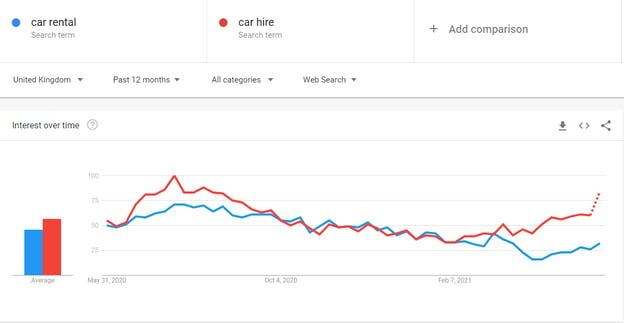
(Google Trends for "car rental" vs "car hire".)
People in these two countries clearly view the search term differently.
It’s your job to understand how users think about the keywords you’re looking to target so you can create relevant content that offers value.
Keyword research with seoClarity allows you to understand geographic changes in vernacular with a few clicks. Not only that — with 30+ billion keywords, this is the largest keyword data set available. Plus, freshness is guaranteed with 1 billion new keywords added each month!
I’m American, so to stick with one of the previous examples, I’m going to enter “security camera”.
But let’s say I need to research this search term in the United Kingdom. I simply select the country where the content will be published.

(Starting a search in seoClarity Topic Explorer.)
Did you know? There are 58 countries in Topic Explorer to choose from.
Topic Explorer’s Intelligent Match is able to decipher how the target audience searchers for our main keyword in a matter of seconds. And it turns out, people in the United Kingdom do search for CCTV cameras:
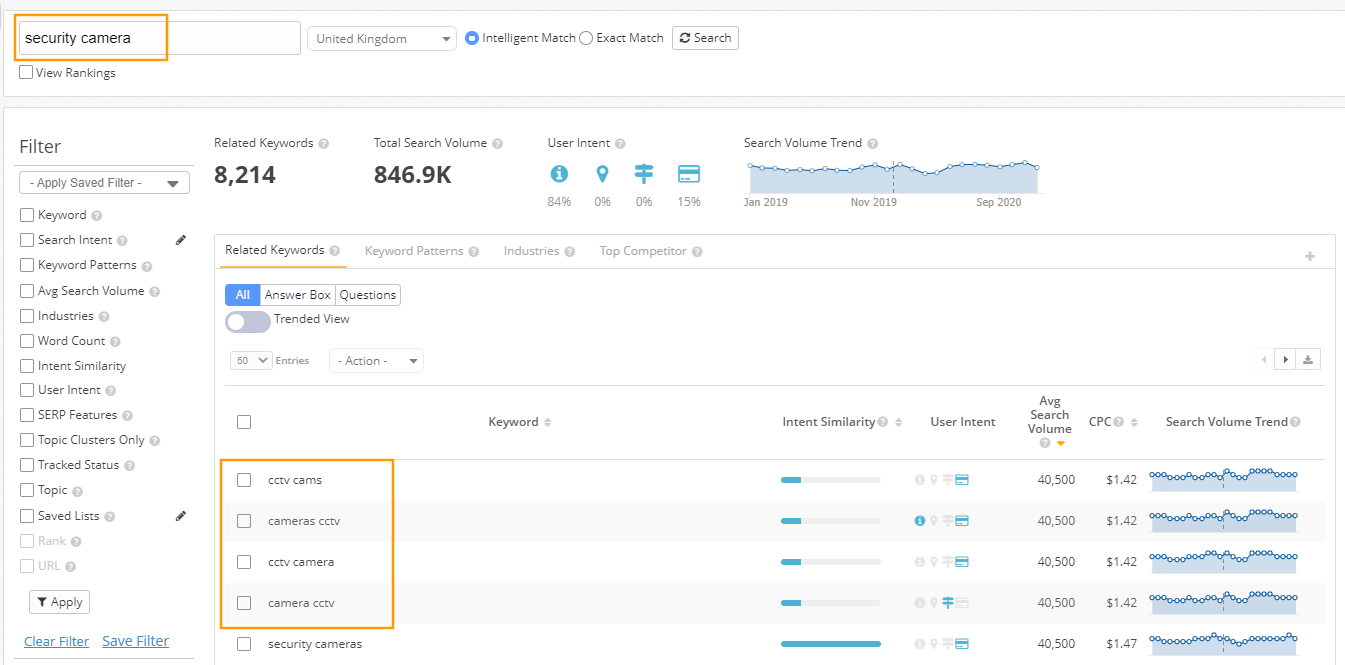
(Topic Explorer shows you how your audience thinks about search queries.)
You’re also free to enter in any domain to see how it performs for these discovered topics. Better yet, see which specific URL ranks to get an inside look at how others cover the subject area.
#2. A Country That Speaks a Different Language
Suppose you're conducting keyword research for a country that speaks an entirely different language than your own — that’s an incredible challenge if you don’t speak the language yourself.
How are you going to surface relevant keywords and ensure you understand their context … all in a foreign language?
Luckily, the same Topic Explorer demonstration that I showed above works for this scenario, too.
Better yet, we follow the same exact procedure:
- Enter in your keyword in your native language (Ex: English, “Security camera”)
- Select the country you’re interested in
- Use Intelligent Match
I’m going to stay with my security camera example, but this time I’ll set the country to France.
All related topics are automatically translated into the language of our target country.
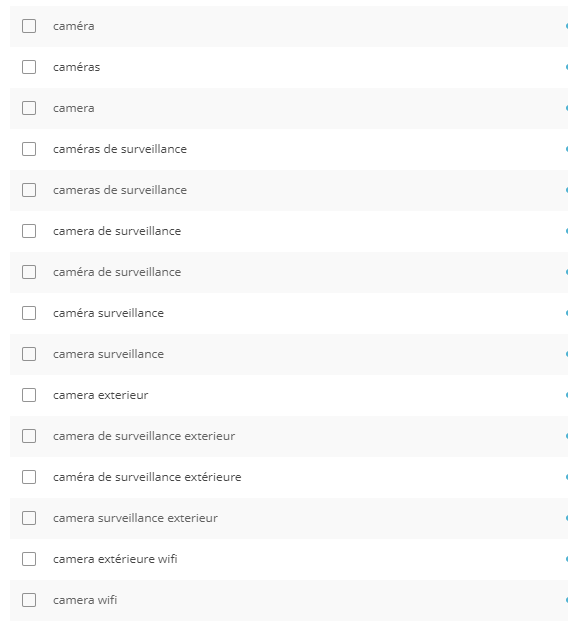 (How users think of “security camera” in France.)
(How users think of “security camera” in France.)
These translations show us how the keyword is searched for in the country we selected.
Pretty cool, right?
Let me show you another example of changes in language and vernacular.
If your website targets an audience interested in projectors in the US and you need to replicate that success in Germany, you may simply translate the term to land on the word “projektor”.
While it is a correct translation, Germans rarely call it this. A better (and more search engine-friendly) keyword is “beamer”.
Just look at the Google Trends comparison:
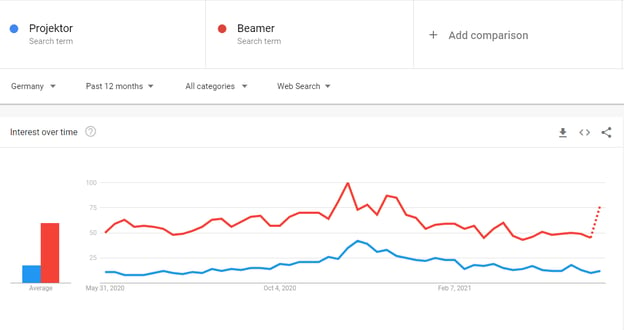 (Google Trends comparing two German terms.)
(Google Trends comparing two German terms.)
I do have to add, and this is important: For international keyword research, it’s important to work with a translator (preferably someone with personal experience with the country) because direct translations do not always convey the proper meaning.
A local translator with a cultural background will also be able to take into account things like currency changes, slang, units of measurement, political understanding, etc.
Just look at how clothing sizes change from country to country:
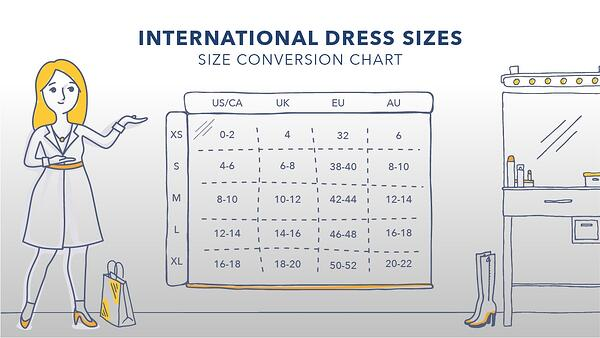
(Cultural considerations can’t be overlooked in your research.)
BONUS: Add keyword translations to the platform to further help these small teams with international SEO.
Competitive Keyword Research
Having a proper understanding of which keywords other domains rank for should be used to inform your own SEO strategy.
Here’s how to do it.
Pick your target keyword. If you’re working with another language, just use the Topic Explorer workflow above to find out how users in a foreign country search for that term.
Enter your keyword into Research Grid and select the appropriate country to see which domains rank for that keyword.
For this example, I’m using one of the French security camera translations (“camera de surveillance”).
I immediately see key insights like search volume, traffic potential, CPC … but what I’m really interested in are the domains that rank for this keyword.
I’ve immediately uncovered 10 of them (four are shown here) but can see 100 if I want to.
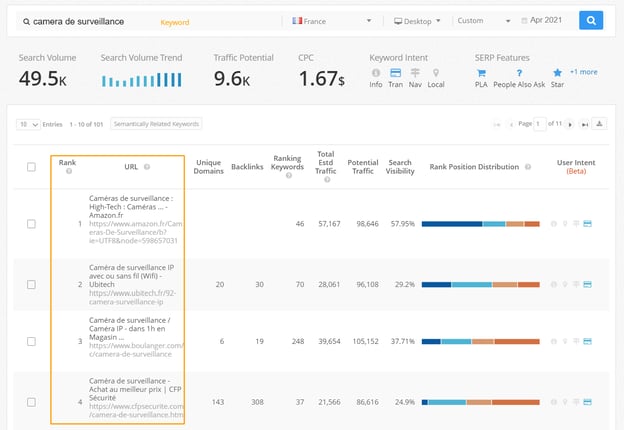
(Top ranking URLs for a search term.)
To find new opportunities, all I have to do is enter those domains (or URLs) into Content Gaps. The system automatically maps which keywords each domain ranks for individually, and which keywords overlap between the two.
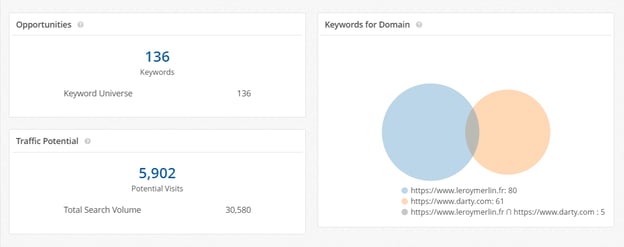
(Use Content Gaps to identify relevant topics.)
BONUS: Users’ primary search engine differs from country to country. Baidu is in our Research Grid database, so you have access to that data.
Next Steps
You’ve done it!
You uncovered target keywords in a market other than your own. Once you’ve uncovered your target keyword, write and optimize content around that keyword and topic with an AI-driven content writer like Content Fusion.
For the full guide on global SEO and all of its considerations, reference our Ultimate Guide to International SEO for Enterprise Sites. It covers:
- Country and language targeting
- International search engines
- Hreflang attributes
- URL structure
- International link building
- And plenty more!







Comments
Currently, there are no comments. Be the first to post one!